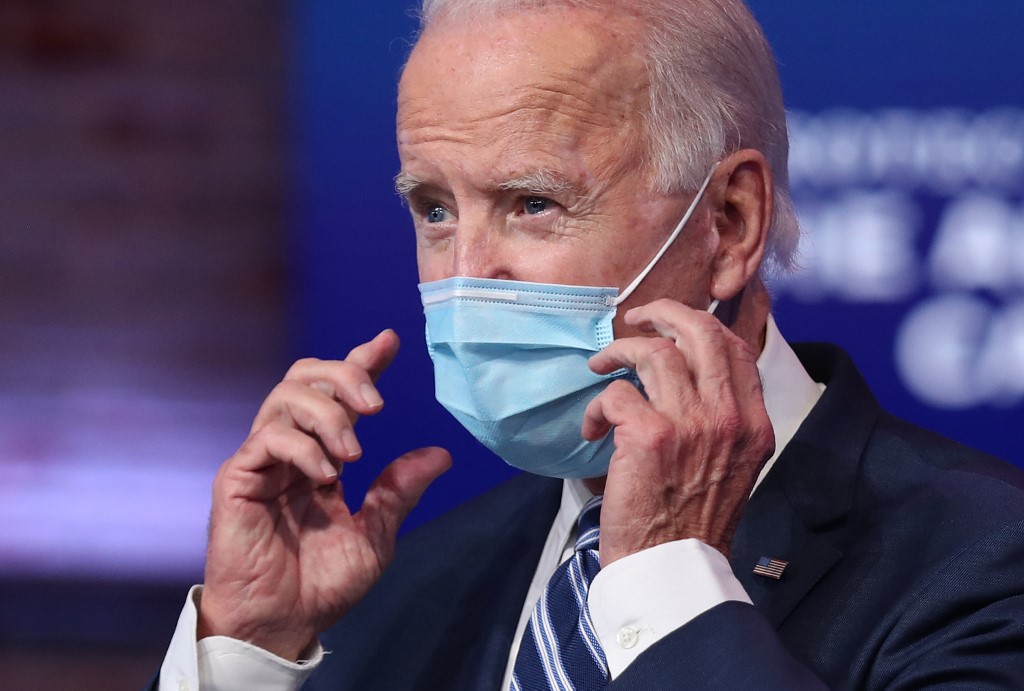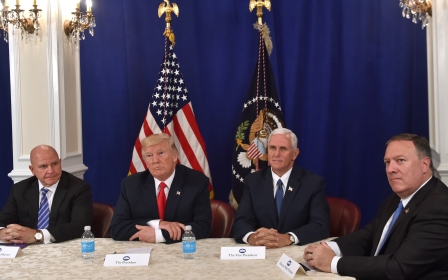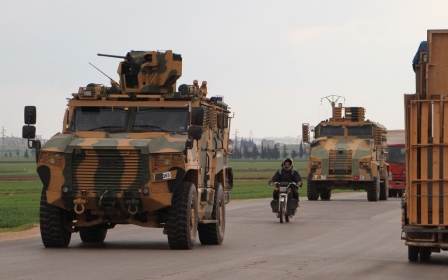Why Syria will be low on Biden's list of foreign policy priorities

What does Joe Biden’s election mean for US policy on Syria? The civil war has moved on in the four years since Biden has been out of power, but it remains an unresolved domestic and regional conflict that could give this new administration a headache.
US President Donald Trump has a mixed and inconsistent record in Syria. On the one hand, he abandoned former president Barack Obama’s policy of actively seeking the overthrow of Syrian President Bashar al-Assad, ending support for the armed opposition in 2017. On the other hand, he launched missile strikes on Assad’s forces after they used chemical weapons in 2017 and 2018, and approved the imposition of harsh Caesar sanctions.
With the defeat of IS, the war is no longer making regular headlines in the US, and Biden has already indicated that other areas will take precedence
In eastern Syria, Trump continued Obama’s anti-Islamic State (IS) policy, backing Kurdish-dominated Syrian Democratic Forces (SDF) fighters to destroy the so-called caliphate and killing its leader, Abu Bakr al-Baghdadi. But he then abandoned his former allies, allowing a 2019 Turkish attack on the Kurds after withdrawing most US ground troops, leaving only a skeleton force behind around eastern Syria’s oilfields.
Trump similarly took up contradictory positions on the key external players in Syria. He was confrontational with one key Assad ally, Iran, yet accommodating with the other, Russia. He likewise seemed very willing to listen to requests by Turkish President Recep Tayyip Erdogan, sometimes even against the advice of US military leaders. Washington’s influence in Syria, already limited, was therefore diminished further by four years of Trump.
Will Biden attempt to step up US involvement? It is worth recalling his role on Syria policy as Obama’s vice president. Unlike former Secretary of State Hillary Clinton, he was sceptical of deep involvement in Syria’s civil war. He was unenthusiastic about arming the opposition, fearing the radicals among them.
Biden, like most of Obama’s cabinet, had supported striking Assad in 2013 when chemical weapons were used - but after the president opted instead for negotiated disarmament, Biden backed him. Later, in 2016, the vice president lamented critics who said Obama had done too little against Assad, dismissing their recommendations as unrealistic and unfeasible.
Domestic priorities
Biden’s recent statements also suggest that Syria will be low on his to-do list. With the defeat of IS, the war is no longer making regular headlines in the US, and Biden has already indicated that other areas will take precedence.
Domestic affairs, such as the Covid-19 pandemic and related recession, occupy most of Biden’s attention, and foreign policy priorities will likely focus on multilateralism, the pivot to Asia, China and climate change.
In the Middle East, Biden has pledged to re-enter the Iran nuclear deal, provided that Tehran adheres to its stipulations, while his team has indicated a more critical stance towards Saudi Arabia. Managing difficult allies, such as Israel and Turkey, will also be in focus.
While Biden has said more broadly that he wants to support fellow democracies globally, in the Middle East, his stated focus appears to be more on counterterrorism than regime change. Combined with his recent statements about ending “forever wars” and opposing increased US boots on the ground, this suggests Biden will not be rushing to increase Washington’s stake in the Syria conflict.
He is unlikely to step back, though. The veteran Democrat's advisers have insisted he will maintain tough sanctions on Damascus, and the vice president-elect, Kamala Harris, has spoken out against Assad in the past. Though the sanctions are aimed at pressuring Assad into reaching a settlement, or at least pressing Moscow to push the Syrian president aside for someone who will, such efforts rarely achieve their goals.
Maintaining pressure
Regarding Assad, Biden’s policies may look much like Trump’s: maintaining pressure financially, but without any serious military escalation or diplomatic investment that could actually force the Damascus regime to collapse or compromise.
In the east, Biden has said he would maintain the small contingent of US forces present to guard against any IS revival, while Harris was appalled at Trump’s abandonment of the Kurds in 2019. This could mean a revitalisation of the SDF-US alliance, but as Trump found, this would complicate efforts to improve ties with Turkey and may prove short-lived.
Indeed, as under Obama, US policy towards Syria may find itself swayed by priorities elsewhere. Biden could use policies against Assad to pressure Iran on the nuclear deal, but may similarly ease off if Tehran is compliant. By the same token, Biden is far more hostile towards Russia than Trump, and he may use Syria policy to stand up to Moscow - although under Obama, anti-Putin actions tended to focus more on Europe.
Syria policy may also be shaped by the state of US relations with Israel and Turkey. If ties are warm with Israel, Syria may see continued Israeli raids on Iranian positions, while if they sour, Biden may urge such strikes to stop. Turkey’s ambitions to push the SDF from its border will likewise be partly conditioned by its ties to Washington, as has been the case in recent years.
Huge challenges
In sum, then, don’t expect major changes from Biden on Syria. He will likely approach the conflict with the same caution he did as vice president, and he is unlikely to step up US military involvement. That said, he has little incentive to step back from existing US policies: keeping some forces in the east and maintaining sanctions on Assad.
One final unknown is whether his predecessor will leave Syria alone during his remaining 10 weeks in office
With Biden’s priorities elsewhere, Syria policy is likely to dramatically alter only if there is a major headline-grabbing change on the ground, or if Washington’s other foreign priorities are impacted by it. Policy towards Iran, Turkey, Russia and Israel could all have reverberations in Syria - but at present, it seems unlikely Biden will expend political capital on the Syria conflict in isolation.
One final unknown is whether his predecessor will leave Syria alone during his remaining 10 weeks in office. While Trump is likely to focus on challenging the legitimacy of his election defeat, some have speculated that he may also use his last weeks in office to sabotage Biden. Syria could be one arena for this, perhaps with Trump fulfilling his promise to withdraw the last remaining troops from the east. This may seem unlikely, but Trump has shocked throughout his presidency.
Even without any such final curveball, Biden faces huge challenges in rebuilding Washington’s global reputation. While Syria will almost certainly receive some attention in this, it is unlikely to be centre stage.
The views expressed in this article belong to the author and do not necessarily reflect the editorial policy of Middle East Eye.
This article is available in French on Middle East Eye French edition.
Middle East Eye propose une couverture et une analyse indépendantes et incomparables du Moyen-Orient, de l’Afrique du Nord et d’autres régions du monde. Pour en savoir plus sur la reprise de ce contenu et les frais qui s’appliquent, veuillez remplir ce formulaire [en anglais]. Pour en savoir plus sur MEE, cliquez ici [en anglais].







